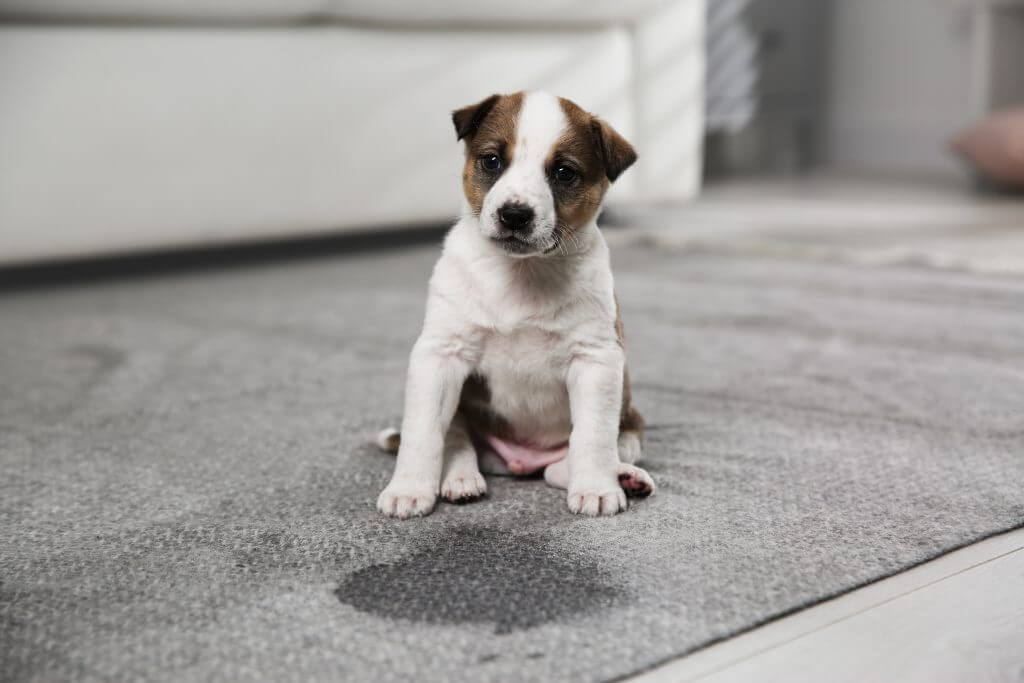Housebreaking or potty training your puppy is vital to getting your new puppy acclimated to its surroundings and setting rules where they know it is not allowed to misbehave or have accidents on your floors. Throughout this housebreaking series, we will be going over three pillars that are essential to teaching your puppy. Remember, every puppy will move and learn at its own pace. All types of training take time and patience to build a lasting bond of trust between you and your puppy. The unavoidable fact is that messes in the house are simply part of puppy ownership. For more information on the three pillars of housebreaking, continue reading below!
Confine
The first pillar of housebreaking is confinement. By nature, dogs are den animals, which gives them comfort and security. Due to restricted space, many owners choose to use a crate for their dog’s den or safe space. However, this location may be challenging for your pup if not introduced correctly. When you begin crate training, it is essential to know that your puppy will not be happy as they are unfamiliar with this new den and are not surrounded by the warmth of its mom or litter mates. Throughout a puppy’s adjustment period, their crate will become their safe space, similar to a den for wild dogs. An important tip is that puppies and dogs do not want to relieve themselves in their area; if they do, it is an emergency. Dogs and puppies will do everything possible to keep their messes far away from their crate.
Supervise
Although confinement can bring a sense of comfort to your puppy, they cannot spend their life in only their crate or designated potty area. Your second pillar of housebreaking to follow is to supervise your puppy. Your puppy needs to feel and play like a puppy while exploring its surroundings. However, while a puppy is young, it is crucial to do these play times under direct supervision. Puppies typically will show a sign when it’s time to relieve themselves, but here are three leading indicators of when they will need to be in their designated potty area.
- After walking or waking up from a nap
- During or after vigorous play
- After eating or drinking
Once you understand these times of relief, another indicator your puppy may need to go is if they stop what they are doing and begin to sniff frantically. When that happens, immediately get them to their potty area to prevent an accident.
Throughout these two pillars, your puppy will have limited time for an accident without being observed. Remember, puppies have limited to no bladder or bowel control, so it is essential to observe their behaviors and allow ample amounts of time for them to relieve themselves.
Regulate
Our third and final pillar is to regulate. Regulation in this situation puts your puppy on a routine where they can count on you to help them to their designated potty area. Just like toddlers, they can’t tell you when they have to go, but you begin to follow their patterns and expressions when they need to go. This routine you set for yourself and the puppy is beneficial to housebreaking them. Regulating feeding and relief times will put your puppy on the track to success. Avoid elements such as free feeding and set specific routines for feeding times. This will allow you to begin and calculate that your puppy is ready to go potty 10-15 minutes after feeding time. As dogs are creatures of habit, any routine will help them begin the housebreaking process.
Contact Us Today
If you just welcomed a new puppy home, try to follow these three pillars to encourage your puppy to be housebroken. Our expert trainers at Leader of the Pack look forward to welcoming your new furry friend and our beginner obedience classes! For more information or help with housebreaking your puppy, please contact us by phone at 617.296.1711 or email us at leaderofthepackdogtraining@yahoo.com. We look forward to working with you and your puppy!
